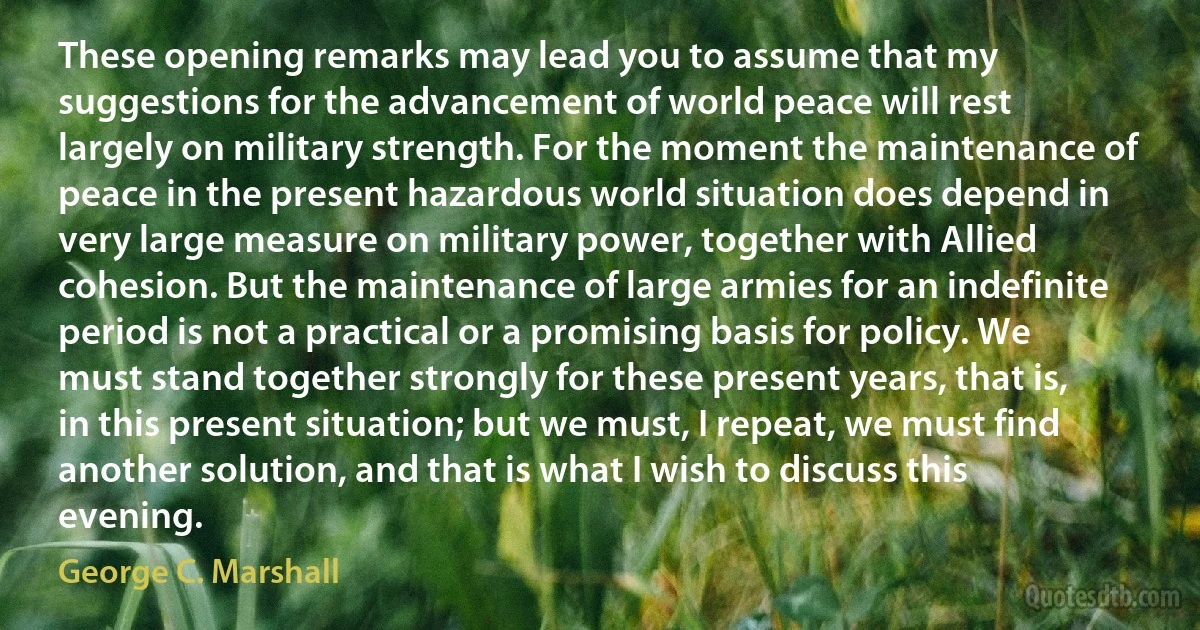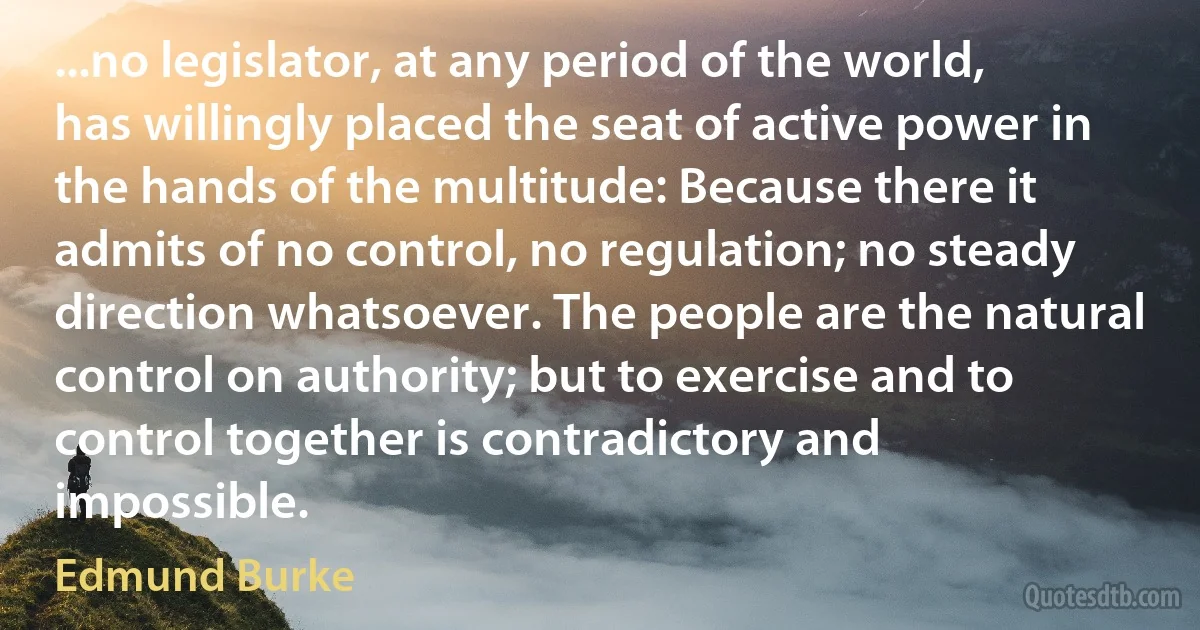Period Quotes - page 84
It is not a question of the mass-man being a fool. On the contrary, to-day he is more clever, has more capacity of understanding than his fellow of any previous period. But that capacity is of no use to him; in reality, the vague feeling that he possesses it seems only to shut him up more within himself and keep him from using it. Once for all, he accepts the stock of commonplaces, prejudices, fag-ends of ideas or simply empty words which chance has piled up within his mind, and with a boldness only explicable by his ingenuousness, is prepared to impose them everywhere.... Why should he listen if he has within him all that is necessary? There is no reason now for listening, but rather for judging, pronouncing, deciding. There is no question concerning public life, in which he does not intervene, blind and deaf as he is, imposing his "opinions."

José Ortega y Gasset
"For a brief period for the seven mystic years that stretched between Johnson's 'Swing Around the Circle' to the Panic of 1873-the majority of thinking Americans of the North believed in the equal manhood of Negroes," W.E.B. Du Bois wrote in 1935. "While after long years the American world recovered in most matters, it has never yet quite understood why it could ever have thought that black men were altogether human." These Americans believed black lives mattered. But only for a moment.

W. E. B. Du Bois
Had optical perception not evolved into something more than sensory perception, into super-sensory perception, then the present period would never have had the courage to discover the spiritual in matter. There would have been no fundamental difference between a painting by Picasso [from Picasso's so-called 'abstract' period] and one by Paulus Potter [Dutch painter from the 17th century, famous for his painting of cows].

Theo van Doesburg
[T]he establishment of freedom of trade and of a general disposition to remove from trade every possible restriction and every possible burden...has been the main agent in raising the commerce of the United Kingdom to that extraordinary position it has now attained. I apprehend that I am stating the matter very moderately if I put it thus, that in the course of the last 30 years our population has increased somewhere about 25 or 30 per cent., while our trade in the same period has increased in the ratio of certainly something not much under 400 per cent.

William Ewart Gladstone
This is not the first period during which we have confronted the difficult problem of using difference as a way of bringing people together, rather than as incontrovertible evidence of separation. There are more options than sameness, opposition, or hierarchical relations. One of the basic challenges confronting women of color today, as Audre Lorde has pointed out, is to think about and act upon notions of equality across difference. There are so many ways in which we can conceptualize coalitions, alliances, and networks that we would be doing ourselves a disservice to argue that there is only one way to construct relations across racial and ethnic boundaries. We cannot assume that if it does not unfold in one particular way, then it is not an authentic coalition.

Angela Davis
The principle that I am laying down I am not laying down exceptionally for Ireland. It is the very principle upon which, within my recollection, to the immense advantage of the country, we have not only altered, but revolutionized our method of governing the Colonies. ... England tried to pass good laws for the Colonies at that period; but the Colonies said-"We do not want your good laws; we want our own." We admitted the reasonableness of that principle, and it is now coming home to us from across the seas. We have to consider whether it is applicable to the case of Ireland. ... I ask that in our own case we should practise, with firm and fearless hand, what we have so often preached-the doctrine which we have so often inculcated upon others-namely, that the concession of local self-government is not the way to sap or impair, but the way to strengthen and consolidate unity.

William Ewart Gladstone
A century hence, 2000 may be viewed as quite a primitive period in human history. It's something to hope for. ... I am, and ever will be, a white-socks, pocket-protector, nerdy engineer - born under the second law of thermodynamics, steeped in the steam tables, in love with free-body diagrams, transformed by Laplace, and propelled by compressible flow. As an engineer, I take a substantial amount of pride in the accomplishments of my profession.

Neil Armstrong
That the Macedonians were of Greek stock seems certain. The claim made by the Argead dynasty to be of Argive descent may be no more than a generally accepted myth, but Macedonian proper names, such as Ptolemaios or Philippos, are good Greek names, and the names of the Macedonian months, although differed from those of Athens or Sparta, were also Greek. The language spoken by the Macedonians, which Greeks of the classical period found unintelligible, appears to have been a primitive north-west Greek dialect, much influenced by the languages of the neighboring barbarians.

J.R. Hamilton
I walked into the range, rented a handgun from the ugly old redneck cashier, and started to practice shooting at paper targets. As I fired my first few rounds, I felt so sick to the stomach. I questioned my whole life, and I looked at the gun in front of me and asked myself "What am I doing here? How could things have led to this?” I couldn't believe my life was actually turning out this way. There I was, practicing shooting with real guns because I had a plan to carry out a massacre. Why did things have to be this way, I silently questioned myself as I looked at the handgun I was holding in front of me. I paid my fee and left the range within minutes, feeling as if I was going to be sick. I spent the rest of the waiting period at the Coffee Bean in Oxnard, where I sat by myself feeling absolutely disgusted. My whole world was twisted.

Elliot Rodger
Historically, the claim of consensus has been the first refuge of scoundrels; it is a way to avoid debate by claiming that the matter is already settled. Whenever you hear the consensus of scientists agrees on something or other, reach for your wallet, because you're being had.
Let's be clear: the work of science has nothing whatever to do with consensus. Consensus is the business of politics. Science, on the contrary, requires only one investigator who happens to be right, which means that he or she has results that are verifiable by reference to the real world. In science consensus is irrelevant. What is relevant is reproducible results. The greatest scientists in history are great precisely because they broke with the consensus. There is no such thing as consensus science. If it's consensus, it isn't science. If it's science, it isn't consensus. Period.

Michael Crichton
If you had said to a young Syd, ‘Look, this is your bargain in life, you know, you're going to do this fantastic stuff, but it won't be forever, it'll be this short period. There's the dotted line, are you going to sign for this?' I suspect, maybe, a lot of people would sign for that, for making their mark.

Syd Barrett
Similarly calculating from the available figures for the three countries, the Hindu percentage had come down to 65.15% in 1991. To evaluate the trend of the Hindu percentage, we must take into account that the pre-Independence census always had a tentative category "tribal" or "animist", variously defined and therefore making odd quantitative jumps (but always between 2.26% and 3.26%), from 2.57% in 1881 to 2.26% in 1941. After Independence, this category was included in the Hindu category. So, putting everything on the post-Independence denominator, we include the "animists" in the Hindu percentage to get a total Hindu percentage of 77.35% for 1881, 71.72% for 1941, and 65.15% for 1991. Here again, we see a long-term acceleration of the observed trend: a decrease of 5.63% in the sixty years between 1881 and 1941, and a larger decrease of 6.57% in the shorter period of fifty years between 1941 and 1991.

Koenraad Elst
Here again there is a parallel: informed Hindus are pained by the denial of their centuries of suffering at the hands of Islam, and are likewise pained by the denial of their millennia of civilization-building, a denial which goes by the name of Aryan Invasion Theory... for Indians, the AIT likewise implies the denial of a long stretch of Indian history. The AIT denies principally the history of the Solar and Lunar dynasties and other tribes living in Aryavarta (the area from Sindh to Bihar and from the Vindhyas to Kashmir), as covered in the Flu for a period from the dawn of proto-history to the 1st millennium BC. The major motifs (epics, artistic standards, schools of philosophy) of Indian civilization are embedded in that history, which is simply denied in its long pre-1500 BC phase, and vilified as merely the cultural superstructure of an ethnic subjugation of pre-Aryans by Aryans in its post-1500 BC phase.

Koenraad Elst
[Having to negotiate new trading rules from scratch would lead to a long period of unacceptable uncertainty for British business.] Seven years of not knowing what the arrangements would be for trading with Europe... Seven years of uncertainty for businesses wanting to invest in Britain not knowing what our relationship with Britain would be. They cannot be justified. They cannot be in our national interest. We should reject that out of hand.

David Cameron
From the date... when he was yet a very young man, and making excursions on foot through the different counties of England, till that which we are now arrived at, a period of about thirty years, he had never ceased to study the natural history of the globe, with a view of ascertaining the changes that have taken place on its surface, and of discovering the causes by which they have been produced.

James Hutton
We must stop using the word "race” as a cultural determinant and start using it for what it really is. It is a unifying word. There's no two ways around it. The Caucasian people will have to accept the fact that the changes of diversity on the planet are constant, and that we propagate ourselves at a higher rate. So as far as I'm concerned, people, come to terms with it. You want to really understand the future? You're going to have to understand that there's only one race, and that's the human race. Period.

Edward James Olmos
For me, growing up in the 1930s, the two motivations powerfully reinforced each other. The miserable failures of capitalist economies in the Great Depression were root causes of worldwide social and political disasters. The crisis triggered a fertile period of scientific ferment and revolution in economic theory.

James Tobin
One day our Sodom and Gomorrah would be trampled by some all-powerful foot, and this world which laughed, reveled, and forgot God would be transformed, in its turn, into a Dead Sea. At the end of every period God's foot comes along in this way and tramples the cities of the overindulged belly, the overdeveloped mind. I felt afraid (Sometimes it seems to me that this world is another Sodom and Gomorrah just before God's passage above it. I think the terrible foot can already be heard approaching).

Nikos Kazantzakis
How can anyone have a true sense of the Hebrew race without crossing this terrifying desert, without experiencing it? For three interminable days we crossed it on our camels. Your throat sizzles from thirst, your head reels, your mind spins about as serpent-like you follow the sleek tortuous ravine. When a race is forged for two score years in this kiln, how can such a race die? I rejoiced at seeing the terrible stones where the Hebrews' virtues were born: their perseverance, will power, obstinacy, endurance, and above all, a God flesh of their flesh, flame of their flame, to whom they cried, "Feed us! Kill our enemies! Lead us to the Promised Land!"
To this desert the Jews owe their continued survival and the fact that by means of their virtues and vices they dominate the world. Today, in the unstable period of wrath, vengeance, and violence through which we are passing, the Jews are of necessity once again the chosen people of the terrible God of Exodus from the land of bondage.

Nikos Kazantzakis



